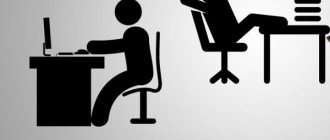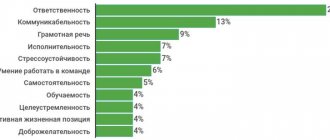Almost everyone who gets a job goes through this test - a preliminary conversation with HR, HR or their immediate superior. Someone is asked a couple of questions: “Do you have any experience?”, “Are the conditions okay?” - and immediately offer to sign an employment contract. Others are asked in detail about the slightest nuances: how many C grades are in their diploma, what kind of relationships they had with colleagues in their previous position, and whether they have accounts on social networks. Still others may be sent into a state of shock by being asked to wash the floors in the office or sell someone in the office a roll of toilet paper.
Despite the format of the meeting, the nature of the questions and the personality of the “examiner” himself, you need to know how to behave during an interview in any setting - both formal and extraordinary. Knowing some of the nuances will allow you to get your dream job and prove yourself well in a new place from the very first meeting.
What to remember during an interview
How to successfully pass an interview? Show attention to detail: having received an invitation, write down the name of the company, contacts, and the name of the person with whom you are going to talk. But be careful when calling him by name and patronymic if you don’t know the HR person by sight, otherwise you risk finding yourself in an awkward situation.
An important nuance during an interview is the attitude: you are not going for an exam, but for negotiations. The company is also interested in qualified employees, because recruiting personnel is not an easy task. Why then do HR whip up pathos, mention a competition for a vacancy, and the presence of talented applicants? They try to push people to make concessions: agree to a lower salary out of fear that the position will go to a competitor, or accept an inconvenient work schedule. Potential employers mention that the competition consisted of 100 applicants, and you made it to the top 10? There is a high probability that unpleasant surprises await you. Even international companies do not disdain this technique!
In negotiations regarding a vacancy, the company also proves its attractiveness to the applicant. Don't fall for tricks and don't lower the bar.
The salary level remains an important aspect when applying for a job. Don't be afraid to say what you want when you're interviewing: getting enough income to cover your needs is the main goal. The position will have to be argued, so think about why the amount is justified. How to behave during a job interview to get a decent salary? Do not appear as a supplicant, but do not act condescendingly: calm self-respect is enough.
Main types of impact
In order to get to know a candidate for a vacancy better, many methods are used. Specially formed departments or centers in organizations deal with issues of competent personnel selection. The main techniques used by personnel workers are various questionnaires, tests offered to applicants, and interviews. It is necessary to consider each of them in detail.
How to Pass a Job Interview: Prepare Your Answers
Searching for vacancies and sending out your resume bore fruit, and you were invited for an interview. But it’s too early to rejoice, because only the first step in the right direction has been taken. To succeed in your interview, take the following steps:
- Review the job posting and think about the qualities required by the applicant. Make a list of your skills and abilities, check how much it matches the first list.
- List at least 10 qualities that make you a good candidate for this job. Think about when they were demonstrated: when the HR asks you to illustrate the statements with examples, you will be ready.
- Study information about the company, write down questions that arise during the familiarization process. You will need to look at the “About Us” column on the website, look for reviews online and read articles in independent publications covering the work of the enterprise. Think about what distinguishes the company from its competitors - when HR asks why you want to cooperate, you will give an answer.
- Even if you are applying for a modest position, the first impression should be impeccable. Choose your clothes in advance, and on the morning of the big day you won’t find your jacket dirty or your shoes in need of repair. If necessary, wear a business suit; relaxations are possible when you join a young and creative team. But the appearance should be neat, and the use of accessories should be moderate. Women should give up earrings in the form of pendants or an abundance of bracelets, and men will limit themselves to watches and a wedding ring. When it comes to perfume, remember the rule “less is more.” There is no need for cologne or perfume during an interview.
- Practice answering typical interview questions. Involve a friend or family member to add a touch of improvisation to the process. Thanks to such rehearsals, you will not have to frantically search for answers during the meeting.
Don’t be lazy to set aside time for preparation, because you will save yourself from lengthy interviews. Remember that the best improvisation is the one you have rehearsed in advance. Formulated answers and questions will save you from unpleasant moments.
Pros and cons of surveys
Questioning is the most common technique used by employers to get to know their potential employees. Its undoubted advantages are simplicity, the ability to indicate many diverse questions in the questionnaire, speed, ease of use, as well as the completeness of the information reflected in it. However, there are also serious drawbacks to this technique. Thus, when filling out a questionnaire, the easiest way for a candidate to deceive a potential employer is to indicate only positive information about his personality, which the employer wants to see. In addition, compiling a list of questions is a responsible matter. In order to obtain complete information about the applicant and avoid possible double interpretation of candidates’ answers to the questions posed, companies have to involve a wide range of specialists in the preparation of questionnaires - lawyers, psychologists, sociologists.
What you can't miss to pass an interview
Since the impression is made up of little things, collect your documents in advance. A prepared list of questions or a copy of your resume will show that you are interested in the position. You will need the following:
- A passport or driver's license will be needed if entry to the building is based on passes.
- A notepad where you write down the company address and HR name will also come in handy during the conversation. Don't skimp on buying a solid accessory and a stylish pen!
- A list of questions of interest will allow you not to remain silent during the interview when the time comes to ask the employer about the nuances.
- A list of recommendations will help make an impression. Indicate the contacts of 3 people from your field of activity who can confirm your qualifications.
- The portfolio remains a necessary part, but its format depends on the specifics of the activity. If it is not possible to print your work due to its peculiarities, bring a netbook to the interview.
What not to do? Don't bring your parents or friends! Hiring managers note that applicants for positions at different levels make the mistake. If parents interfere with the process of getting a job, consider that you missed out on the vacancy.
Don't chew gum or take a glass of coffee with you: when you are invited into the office, the details will look undignified.
How to behave before, during and after an interview
People come to the interview without delay, so plan your route in advance and, if possible, walk to the desired point. When you arrive at your destination on the appointed day, remember to be polite. Say hello to the receptionist and HR manager, shake hands, don’t look away, but don’t look straight at them either. Before starting a conversation, turn off your phone to avoid distractions.
These questions will be asked during the interview: whether you get the job depends on the answers.
During the interview, do not forget that it should not turn into a monologue. HRs are taught that the ratio of their remarks to the applicant’s stories is ideally 30/70%. Your goal is to adjust the numbers to 50/50% and control the development of the conversation.
The interviewer asks what professional mistake did you make at your last job? It is unlikely that you are interested in a detailed story, so do not leave things to chance. Don't be afraid to think about your lines, because you don't have to give an answer in milliseconds. Remember that applicants speak quickly due to anxiety. Don’t make the mistake of listening to yourself and shutting up when necessary. You can say out loud what you need to think about. But at the end of the interview, when it’s your turn to clarify the details, reflections are inappropriate. Bring out a prepared list of questions and show that you are taking the job seriously.
Finally, know when to expect a response from the company. To speed up the process, say: “Will you notify me of the decision by next Monday? If there is no news by Friday, can I call or email?” You will show interest in the vacancy and avoid long waits.
Mistakes to Avoid
An interview is an event that makes a person very nervous. This fear is understandable - fear of the unknown, fear of disgracing yourself, not answering tricky questions, being late, not being liked outwardly.
There are many fears, they need to be overcome. In order to look confident on an important day, it is better to avoid unwanted actions the day before.
- A good night's sleep will allow you to gain strength and look cheerful and fresh in the morning. A person who has slept for 2-3 hours, has bruises under his eyes, and constantly yawns is unlikely to be liked by the employer. If sleep does not come due to worries, you can drink tea with chamomile and honey. No sleeping pills - there is a high risk of oversleeping the event.
- The day before - only proven, simple food. The day before the interview and immediately before it, you should not eat fast food or spicy dishes. Digestive problems and sounds coming from the stomach can ruin the mood not only for yourself, but also for those around you.
- No alcohol. Do not drink alcohol at all for 1-2 days. It impairs brain function, memory, and attention. Plus it significantly spoils the overall appearance.
- Immediately before a meeting with your boss, it is better not to drink a lot of liquid. Finding a toilet can take up valuable time and make you feel embarrassed and nervous.
How to successfully pass a job interview - answers to questions
In order not to select answers under the gaze of HR, think over them at home. The following options will help you:
- Tell us about yourself. With this phrase, the candidate is invited to share information at his discretion. Don't miss the chance to stand out from your competitors, but don't get carried away with originality. Briefly describe a hobby that is not clearly related to work, but provides a positive characteristic. A passion for yoga speaks of attention to health, a love of crossword puzzles indicates inquisitiveness and resourcefulness, volunteer work indicates a desire to be useful to society. Move on to your professional activities: “In addition to hobbies, work is an important part of life, so I’ll tell you about the traits that help you cope with tasks.” Select 3-4 positive qualities needed for the position, and mention that you will talk about other strengths during the interview.
- Where do you see yourself in the company in 5 years? Considering that, according to data, the average duration of work at 1 enterprise is 4.5 years, the question seems strange. But you must answer, otherwise the manager will decide that you are not taking your career seriously. Job seekers make mistakes by talking about a promotion where the position does not provide one, or by naming a position that does not exist within the company. Find out in advance what options are available to your organization. Sample answer: “I want to study banking. The short-term goal is to become a qualified operator and assume a responsible position when experience and knowledge allow. In the long term, I see myself as a supervisor. I hope that within the framework of working with the bank *** I will build a solid career that will develop logically.”
- What is your main weakness? Do not answer that there is none: in your work you will not be able to live up to the ideal. Choose a weakness that you have successfully overcome and talk about the strengths that accompany the character trait. After all, isolation is accompanied by self-sufficiency, and anxiety is accompanied by an attentive approach to completing tasks. Subtly highlight how the flaw will help the company.
Before starting the interview, think through several options for answering. Eichar often asks to develop thoughts or name a couple more character flaws, so being prepared won’t hurt. But excessive eloquence is inappropriate: the story should take 2-3 minutes.
IQ test
Nowadays, it is very common to ask candidates for vacancies to complete tasks that will indicate the degree of development of logical and spatial thinking, the ability to memorize several facts at the same time, and the ability to compare and generalize certain knowledge. The most famous and well-written is the IQ test, which was compiled by Eysenck. The result of completing this type of task will give a more detailed answer about the candidate’s intelligence, in particular compared to a questionnaire where the subject describes himself independently.
“Why did you leave your last job”: response to HR
The need to explain the previous dismissal becomes a stumbling block. If you were fired from your previous job, demonstrate that you are wise from bitter experience. Also briefly mention the reasons and focus on what was learned through the collaboration. Possible answers to the tricky question:
- It turned out that the responsibilities differed from those described in the vacancy. When it became obvious that the cooperation was not benefiting either me or the employer, we decided to stop it. Since then, I have improved my communication skills and more clearly defined my professional goals and expectations.
- I prefer to work independently, with a clear understanding of the company's objectives. The type of activity in the previous workplace did not correspond to these character traits.
- I prefer to work in a team where employees are focused on achieving a common goal. Unfortunately, when I took up the position, it turned out that there were internal conflicts in the team. I did my best, and my colleagues praised my tact and organizational skills. But I prefer to focus my energy on working together for the benefit of the company, so I look for a healthy atmosphere.
Although the topic of being fired is unpleasant, maintain a positive attitude. Remind yourself that HR has probably faced difficulties in their career, so your situation is not exceptional.
The main thing is that you do not speak badly about your boss or colleagues, even if the negative attitude is justified!
If you paid on your own, it is easier to explain the situation. Refer to the fact that the tasks you perform have become too easy and you are looking for a job that challenges your abilities. It is permissible to mention that in the old position there was no opportunity for career growth, and combining the search for vacancies with the full performance of duties turned out to be difficult. You are also free to refer to relocation, the search for a convenient schedule, or the desire to prove yourself in a larger company. Just maintain a positive attitude, speak warmly of your colleagues and show mild regret that you had to part ways.
“List your best qualities”: what to answer
How to behave during a job interview? It is important not only to smooth out the shortcomings, but also to correctly present the advantages. Fortunately, this opportunity is given at the interview, because the question about strengths will definitely come up. It is necessary to name the traits needed for the job that distinguish you from other applicants.
Prepare in advance by making a list of 3-5 qualities; Next to each, write examples of how you have used it in the past. If HR asks how a character trait or skill will benefit the company, you will be ready to answer. An example would be the following answers:
- I take my work seriously and do not wait for deadlines, preferring to complete it in advance. Last year I received an award for 3 projects completed a week before the due date.
- I have been working in sales for 10 years and am proficient in various techniques. My performance improves every quarter, and every year I receive an award as the best salesperson.
- My communication skills allow me to effectively interact with clients, colleagues and superiors. At my previous workplace, the manager noted my talents for preparing and delivering presentations.
When asked about your strengths, forget about modesty! But you shouldn’t go into lengthy enumerations of your abilities, because the recruiting manager is interested in the practical application of skills and qualities. Give a short and precise answer with 2-3 examples.
Advantages and Disadvantages of Testing
The advantages of this technique when determining the personal, as well as professional qualities of the applicant are surprise, interestingness, and the possibility of obtaining the right result. But not everything is so simple. It should be remembered that when taking these types of tests, the results can be affected by a person’s mood. In addition, everyone evaluates the elements of reality differently. For example, for one person the color black certainly indicates depression, while for another it indicates superiority, sophistication and courage.
“Why should we choose you”: what answer will help you get a vacancy
Questions that imply a story about the applicant’s advantages often lead to confusion. The time has come to forget that it is immodest to praise yourself: such an attitude will harm you. But statements must be thoughtful, so try to impress the HR manager.
What do you think is the purpose of an HR manager? If you decide that he just wants to find an employee for a vacancy, then you made a mistake. Most likely, the company has a number of problems, and HR is looking for a person who can offer solutions. Your job is to identify what the challenge is and show that you can handle it. Proceed as follows:
- Re-read the vacancy text and write down the requirements for the candidate. Look at the information on the website: there will probably be a detailed description of job responsibilities. Then look at similar jobs online and try to understand what is expected of applicants.
- Select traits and skills from the list and indicate in which work situations you demonstrated them.
Be prepared to talk about every time you showed strong traits and focus on the actions that led to a successful resolution of the problem. Describe the typical difficulties that await an employee in the position you are interested in and tell us how they were overcome in the past. This approach will convince the HR manager that you will find use for your professionalism in the new place.
A little about the survey
There are a number of questions that the candidate is asked to answer independently. As a rule, the questionnaire is a fixed list of questions about the main characteristics of the applicant. These include the date and place of birth of the potential worker, his education, attitude to military service, address, contact phone numbers, marital status, and citizenship. Questionnaires are a lifesaver for HR departments due to the ease of use and completeness of the information received. However, the employer wants to ask candidates for vacancies not only the above questions.
What else to pay attention to: Ace the interview
As you think through answers to common questions, consider the following:
- Determine the amount of your desired salary in advance. You can get by with the vague phrase “I hope to be paid according to the level of my qualifications,” but a specific figure will be more appropriate. When moving to another company, an increase in earnings of 15-20% will be a sufficient incentive to change jobs; Look at offers on job sites to understand the situation on the labor market.
- It is easier to answer the question “Why do you want to work for us?” if you study the history of the enterprise. Don't focus on your benefits: schedule, payment, convenient location. Tell us how you will benefit the company! For example: “I like that the position is related to sales and marketing. At my previous job, I improved sales by 15%, and during a period of stagnation in the market.”
- The question of how you found out about the vacancy should not be difficult. But candidates often go into unnecessary detail: you shouldn’t supplement the answer with a story, as you can’t even imagine that you’ll have to work in another place. Eager to show off your enthusiasm? Say that you saw the ad and didn’t want to miss this vacancy. All!
- During interviews, you are asked to talk about times when you disagreed with your boss’s decision and about your actions. Don’t choose a story where you saw the boss’s mistake and remained silent. Don’t say that you weren’t convincing enough, and the company’s later losses proved you were right. Tell us that early in your career you realized that sometimes you need to defend positions, supporting your arguments with facts and figures. Share your story of how you convinced your manager and saved your company’s budget.
To avoid getting confused during the interview, rehearse at home. The more times you go through standard questions, the more confident you will be in answering! You can figure out how to successfully pass a job interview with the help of this video:
You passed the interview: what to do
After the interview, write down all the questions that caused difficulty: if you don’t get the job, then use them to prepare for new meetings. Also be sure to send a thank you email, since politeness remains a win-win policy. But to stand out, it’s not enough to write: “Thank you for your attention.” You can add a link to a book or article that illustrates an aspect that was mentioned during the conversation. An additional answer to the question is also appropriate: “When you asked me about the main achievement in my profession, I found it difficult to answer. But immediately after the interview I remembered an incident...”
Check out the questions that HR people ask during interviews. Pay attention to clarifications and prepare your answers.
Now you have to be patient and wait for the agreed period. It’s difficult, but don’t pester HR with harassment. Then contact the company in the following way: if you agreed that you will send an e-mail, do not call. They made themselves known twice, but there was no reaction? Proceed to search for new vacancies. But don't give up hope: the job market is fickle, and you never know when an interview will yield results.










